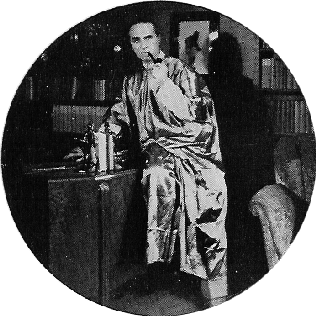
Sax Rohmer
Arthur Henry Ward
15 February 1883
Birmingham, England
1 June 1959 (aged 76)
London, England
Sax Rohmer, Michael Furey, Arthur Sarsfield Ward
Novelist
Life and work[edit]
Born in Birmingham to working class Irish parents William Ward (c. 1850–1932), a clerk, and Margaret Mary (née Furey; c. 1850–1901),[1] Arthur Ward initially pursued a career as a civil servant before concentrating on writing full-time. He worked as a poet, songwriter and comedy sketch writer for music hall performers before creating the Sax Rohmer persona and pursuing a career writing fiction.
Like his contemporaries Algernon Blackwood and Arthur Machen, Rohmer claimed membership to one of the factions of the Hermetic Order of the Golden Dawn.[3] Rohmer also claimed ties to the Rosicrucians, but the validity of his claims has been questioned. His doctor and family friend Dr R. Watson Councell may have been his only legitimate connection to such organisations.
His first published work was issued in 1903, when the short story "The Mysterious Mummy" was sold to Pearson's Weekly. Rohmer's main literary influences seem to have been Edgar Allan Poe, Arthur Conan Doyle and M. P. Shiel.[2] He gradually transitioned from writing for music hall performers to concentrating on short stories and serials for magazine publication. In 1909 he married Rose Elizabeth Knox.
He published his first book Pause! anonymously in 1910.
In 1934, Sax Rohmer moved into a newly refurbished house, Little Gatton[4] in Gatton Road, Reigate, Surrey, where he lived until 1946.
He died after succumbing to Asian flu in 1959.
Other work[edit]
Rohmer became a friend of escapologist Harry Houdini, who wrote to him in praise of Rohmer's The Romance of Sorcery. Rohmer based his mystery-solving magician character Bazarada on Houdini.
The Orchard of Tears is an odd book in the context of Sax Rohmer's other work. There are no Oriental villains or exotic locations; rather, there are gentle rabbits and lambs in pastoral settings and a great deal of philosophical musing. As much as he enjoyed Fu Manchu — and the notoriety and income the character provided — Rohmer had other interests and a markedly serious side. The departure from his expected subject matter is plainly signalled by the book's dedication: "To the slaves of the pomegranate, sons of Adam and daughters of Eve, who drink at the fountain of life, this chalice is offered as a loving-cup".
In The Quest of the Sacred Slipper (1919) terror comes to Britain when a self-centered archaeologist unearths one of Islam's holiest relics—the sacred slipper of the prophet Mohammed. Until it is returned to its rightful people, the implacable Hassan of Aleppo vows his reign of death and destruction shall not cease. Behind these inhuman outrages is a secret group of fanatics. Not even the best men of Scotland Yard seem able to apprehend them.
Tales of Chinatown (1922) is a collection of 10 short stories published in hardcover by Cassell in 1922 and Doubleday, Page and Company in 1922. All of the stories first appeared in magazine format. This collection includes a story that is considered to be one of his best and also has been anthologised many times; "Tcheriapin". The story "The Hand of the Mandarin Quong" was rewritten for this book; first published as "Hand of the White Sheikh", Rohmer changed the setting to a Chinatown background and published it as "The Mystery of the Shriveled Hand"; the title was then changed again for this collection.
Rohmer also wrote several novels of supernatural horror, including Brood of the Witch-Queen, described by Adrian as "Rohmer's masterpiece".[2][8] Rohmer was very poor at managing his wealth, however, and made several disastrous business decisions that hampered him throughout his career.
His final success came with a 1946–1949 BBC Light Programme radio series that led to a series of 1950s novels featuring a female variation on Fu Manchu, Sumuru. The Sumuru series consists of five books. Two films featuring the character played by Shirley Eaton were also produced by Harry Alan Towers, as was a 2003 German film, Sumuru.
Rohmer also wrote numerous short stories; "The Master of Hollow Grange" (1920) is a homage to M. R. James' story "Lost Hearts", featuring a mad scientist who preys on children.[2]
Rohmer's work was banned in Nazi Germany, causing Rohmer to complain that he could not understand such censorship, stating "my stories are not inimical to Nazi ideals".[9]
After World War II, Rohmer and his wife moved to New York, only returning to London shortly before his death. He died in 1959 at the age of 76, due to an outbreak of "Asian flu".
His wife, Rose Elizabeth (Knox) Ward (1886–1979), published her own mystery novel, Bianca in Black, in 1958 under the pen name Elizabeth Sax Rohmer. Some editions of the book mistakenly credit her as Rohmer's daughter. She and Cay Van Ash (1918–1994), her husband's former assistant, wrote a biography of the author, Master of Villainy: A Biography of Sax Rohmer, published in 1972.[10]
For Rohmer's bibliography, see his full list of work.
Related works:
A note on texts: U.S. editions of the Sumuru books (Gold Medal/Fawcett paperbacks) have texts which were frequently corrupted.